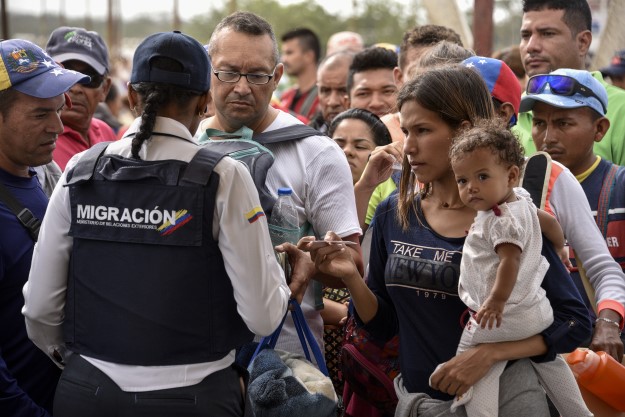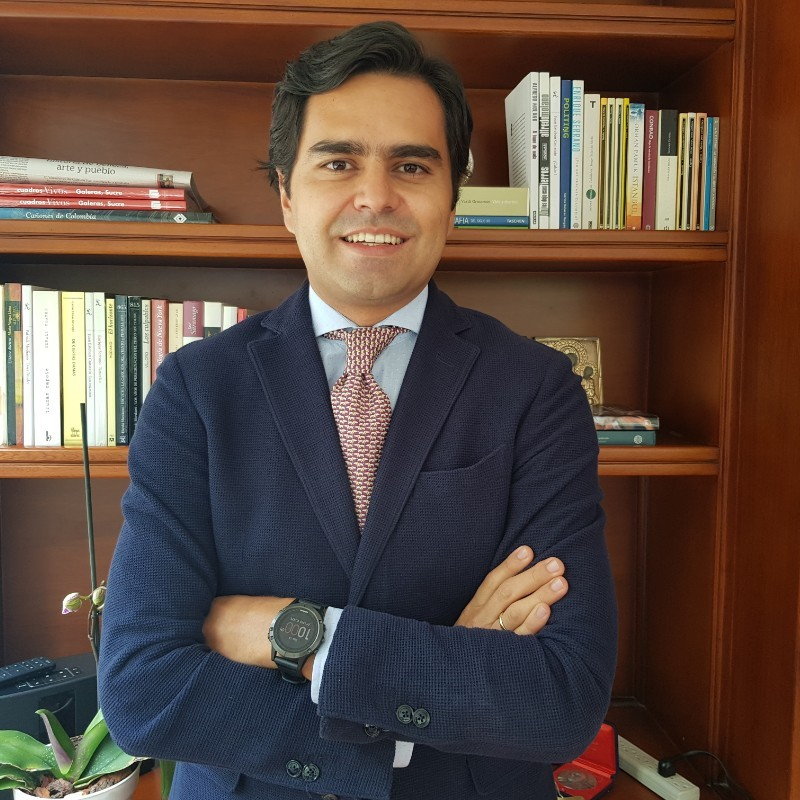Having attended The Hague Academy’s Migration and Local Governance course, alumnus Juan Sebastián Barco López shares his insights on Colombia’s approach to developing a consolidated national migration system that works towards inclusion and integration for migrants.

Venezuelans crossing the border to Colombia. Source: Council of the Americas. 2019.
In contrast to many national anti-immigration postures worldwide, the Government of Colombia has taken a welcoming approach to one of the largest mass migrations in recent history. Of the almost 7 million Venezuelans that have fled social, economic, and political hardship, approximately 2.5 million now reside in Colombia – in addition to thousands of Colombians that have returned from Venezuela. They join an already complex context of migration, where over 5 million Colombians remain internally displaced from ongoing criminal violence, natural disasters, and the only recent culmination of a 50-year civil war.
Migrants from Venezuela often have to deal with challenges like irregular migration status, joblessness, gender-based violence, and exploitation by employers, landlords, human traffickers, and armed groups. Those not registered with the country’s public migration institutions remain invisible and unable to access the support they need to gain a stable foothold in their adopted homeland. Health, education, and justice are unavailable to millions who find themselves at the periphery of the Colombian legal system.
Juan Sebastián Barco López is deputy chief of party for Chemonics, in the USAID-funded Migration Management Activity in Colombia. Known as INTEGRA in Spanish, it is a US$40 million flagship activity for USAID’s migrant-related support in Colombia. With his team, Juan seeks to strengthen Colombia’s capacity for migration governance and service delivery systems at the national, regional, and local levels. Juan took part in our Migration and Local Governance Course in 2022 and shares his takeaways from the course, how he has found a use for them in his work, and his hopes for the future.
Takeaways on Multilevel Governance
At The Hague Academy, Juan examined migration from different angles – like housing, health, education, employment opportunities, and xenophobia. Lessons around government service delivery and multilevel migration governance particularly caught his eye: “The skills and knowledge I wanted to activate were to understand the responsibilities of local authorities and their role to consolidate an integrated response”.
In the Colombian context, weak central administration puts the responsibility of governance and service delivery on local governments. During the course, examples were discussed of how services can be effectively (and more responsibly, with adequate support) delegated to local governments. Juan mentions the practices of Syria and Uganda, with a supranational response to a large-scale migration crisis and a regional refugee and resilience plan respectively. Juan explains that these examples were useful for his work:
 “I used the Syria case framework to design new approaches to deal with some of the issues at the border with Venezuela. The session on Multilevel Governance of Migration and Integration was very helpful for me to work on improving coordination between the national government and the regional and local entities around migration management”.
“I used the Syria case framework to design new approaches to deal with some of the issues at the border with Venezuela. The session on Multilevel Governance of Migration and Integration was very helpful for me to work on improving coordination between the national government and the regional and local entities around migration management”.
Putting Multilevel Governance into Practice
For his Back Home Action Plan, Juan focused on putting the theory of multilevel governance to practice. Upon his return, he supported the creation and strengthening of local coordination structures to address migration challenges. He established a coordination network of nine cities, each with its own migration committees supported by INTEGRA. These committees serve as commissions that manage migration by coordinating different stakeholders in for example housing, health, and education. Moreover, they are motivating the national government to make the National Intersectoral Migration Commission operational, providing a national framework that bolsters local initiatives.
Hopes for the Future
Juan is optimistic regarding Colombia’s success in migration governance. He notes how practitioners around him are establishing a consolidated national migration system that guarantees proper regulation and inclusivity for migrant populations. Still, to achieve a full-fledged migration governance system, Juan acknowledges that practitioners like him should continue designing new mechanisms to guarantee public resources to municipalities, better information processes with better interoperability, and above all opportunities for economic inclusion and integration of migrants.
In ten years, Juan hopes to see a transformation in how Colombians perceive migrants, away from an unwanted strain to an opportunity for their country’s growth.
Join our course!
Interested in learning how local authorities can develop innovative solutions to the complex challenges of displaced populations? Make sure to join our Migration & Local Governance course! The deadline is 26 May 2023 and the course takes place from 10 to 21 July 2023.
Related courses
We offer a diversity of courses throughout the year. Here are several other courses you might like.

